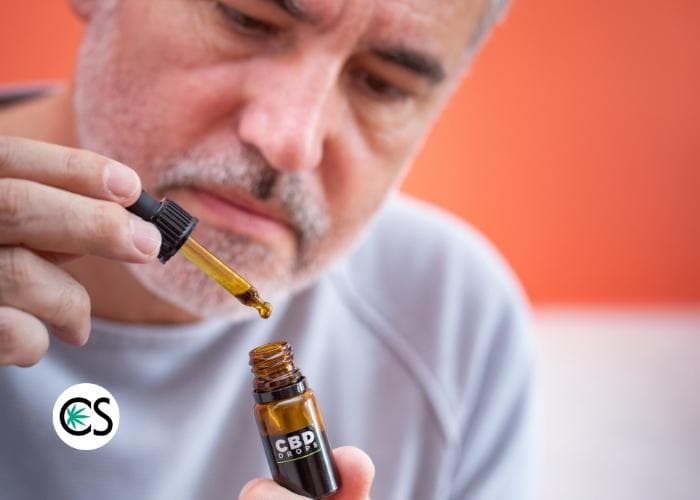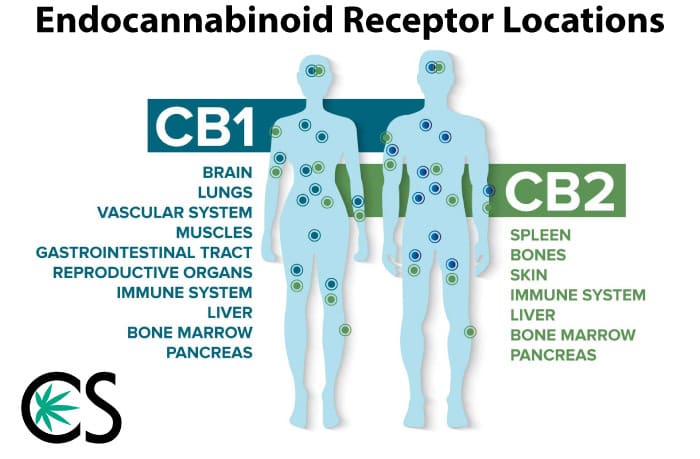
[ad_1]
Have you been on the hunt for a more natural way to assist with your anxiety?
According to the National Alliance on Mental Illness (NAMI), “over 40 million adults in the United States (19.1%) have an anxiety disorder.1 The most common disorders are generalized anxiety order, social anxiety disorder, panic disorder, and phobias. Each of these has its own subcategories and the spider web of what falls under anxiety disorders has many layers, but these four are the main categories.
Anxiety disorders usually stem from either your family’s genes or the environment you were raised in, however, there are other contributing factors.
Maybe you or someone you know deals with some form of anxiety disorder and is looking for some assistance? Perhaps you’ve heard about CBD, or cannabidiol, and have been wondering whether it may assist you with your personal situation.
Well, we have compiled a complete guide which will inform you of what exactly cannabidiol oil is, and the science behind it. As well as the benefits and risks of consuming CBD oil for anxiety sufferers, and which anxiety disorders CBD may help with.

What Is Cannabidiol Oil?
The major element of cannabidiol oil, which is cannabidiol (also known as CBD), comes from the hemp or cannabis plant. Cannabidiol is one of between 80 – 100 cannabinoids that are found in the plant.
Some other cannabinoids that you may be familiar with are THC, CBG, CBN, THCA, and Delta 8.
Now, you may be wondering what the difference is between cannabidiol, which is pretty much legal in all states, and another type of cannabis (that you tend to smoke or consume) which is not legal in all states.
Well, that is because Tetrahydrocannabinol (also known as THC), is only legal to be present in cannabidiol products up to 0.3%. When a cannabidiol product has some percent of THC then that product uses full-spectrum CBD.

THC is another cannabinoid, as mentioned above, that is found in the cannabis plant, that is known for creating the ‘high’ you will find in marijuana.
The other types of cannabidiol that are used in CBD products are broad-spectrum CBD, and CBD isolate, and both of these go through a process to strip out the THC.
The Science Behind CBD
There is not yet a complete understanding of the full extent of how CBD affects you once you have used it, although, more and more studies are being performed yearly.
CBD interacts with two key receptors in your central nervous system and your peripheral nervous system. The endocannabinoid system is made up of the CB1 and CB2 receptors (that are found in the respective nervous systems).

And it is these two receptors that are not yet fully understood by science.
But there are limited findings that prove that the CB1 and CB2 receptors both influence your serotonin levels. And, it is also believed that CBD can have an effect on these particular receptors and, therefore, influence your serotonin levels.
There have been many studies that have been done over the years to understand how CBD interacts with these receptors to better understand how CBD and other cannabinoids can assist our health.2
How Does Cannabidiol Oil Help People With Anxiety?
Now that you understand what cannabidiol oil is, as well as some of the science behind it, you may be wondering whether cannabidiol oil could assist someone who suffers from anxiety.
The National Institute On Drug Abuse has stated that cannabinidiol has relaxing and anti-stress properties.3
One of the ways that CBD may assist is by helping return an elevated heart rate back to normal, which helps in reducing the fight or flight feeling that some people with anxiety may feel.
Our list of the benefits of CBD oil for anxiety sufferers is listed below.

Anxiety Disorders Cannabidiol Oil May Assist With
The key disorders that there is enough evidence of positive effects when a sufferer has consumed CBD oil to help ease their suffering include:
Post-Traumatic Stress Disorder (otherwise known as PTSD).Generalized Anxiety Disorder (otherwise known as GAD).Social Anxiety Disorder (otherwise known as SAD).Obsessive-Compulsive Disorder (otherwise known as OCD).Panic Disorder (otherwise known as PD).
Benefits Of Cannabidiol Oil For Anxiety Sufferers
There are multiple benefits relating to how cannabidiol oil may assist individuals that suffer with anxiety. Here are the key ones to remember:
Consuming CBD may assist those that suffer with insomnia – Having trouble getting to sleep, staying asleep, or maintaining consistent and healthy sleeping patterns, are all common side effects of anxiety. It is the anti-stress elements and calming aromas of CBD oil that help relax your mind, steady your breathing, and get you ready to drift off to sleep. On top of that, CBD oil may help you will sleep deeper for longer.CBD oil can help steady a racing heart – Those who suffer from anxiety usually experiences symptoms of a racing heart, or heart palpitations during an anxious moment or attack. CBD oil may assist in helping to return your heart rate back to its steady and normal pace.Using CBD oil may get you through a particularly stressful time – There are studies that have been completed that show that consuming CBD oil may put you in a calmer state, which can be particularly beneficial if you are about to complete a stressful or anxiety-inducing task.4 Work-stress? A test at college? Or maybe you are conducting a public speech you feel anxious about? Why not give it a go?

Are There Any Risks Involved?
As with any other medication or remedy that you decide to introduce into your diet or lifestyle. There is the possibility of risks, side effects, or limitations on your consumption of the product that you must first be made aware of before you decide whether to consume them. It is always recommended that you speak with your doctor as CBD can have a drug interaction that may result in a negative effect.
Some key side-effects of consuming CBD include:
A decrease in your appetiteChanges or fluctuations in your weightDiarrheaAnd drowsiness or lapses in concentration
Other situational risks that you should take into consideration before consuming any form of CBD, including cannabidiol oil, are:
If you are pregnant or breastfeeding – There has been an insufficient amount of research conducted on how CBD in any form may affect either your pregnancy or your baby if you are breastfeeding.If you are about to drive – The drowsiness that we mentioned before may negatively impact your ability to drive properly.If you have a liver issue – Medical professionals advise caution, so again, please speak with your doctor.
Conclusion
To summarize, if you are or someone you know sufferers from a generalized anxiety disorder, post-traumatic stress disorder, panic disorder, obsessive-compulsive disorder, or social anxiety disorder, you may want to consider cannabidiol oil.
If you are looking for a remedy that may help with either calming you in stressful moments, or helping you if you have trouble either falling or staying asleep, then cannabidiol oil may be the solution that you have been looking for!
references
1Anxiety disorders. NAMI. (2017, December). Retrieved June 11, 2022, from https://www.nami.org/About-Mental-Illness/Mental-Health-Conditions/Anxiety-Disorders#:~:text=Anxiety%20disorders%20are%20the%20most,develop%20symptoms%20before%20age%2021.
Pertwee R. G. (2008). The diverse CB1 and CB2 receptor pharmacology of three plant cannabinoids: delta9-tetrahydrocannabinol, cannabidiol and delta9-tetrahydrocannabivarin. British journal of pharmacology, 153(2), 199–215. https://doi.org/10.1038/sj.bjp.0707442
3Volkow, N. D. (2015, June 24). The biology and potential therapeutic effects of cannabidiol. NIDA Archives. Retrieved June 11, 2022, from https://archives.drugabuse.gov/testimonies/2015/biology-potential-therapeutic-effects-cannabidiol
Shannon, S., Lewis, N., Lee, H., & Hughes, S. (2019). Cannabidiol in Anxiety and Sleep: A Large Case Series. The Permanente journal, 23, 18–041. https://doi.org/10.7812/TPP/18-041
[ad_2]
Source link

Soyez le premier à commenter